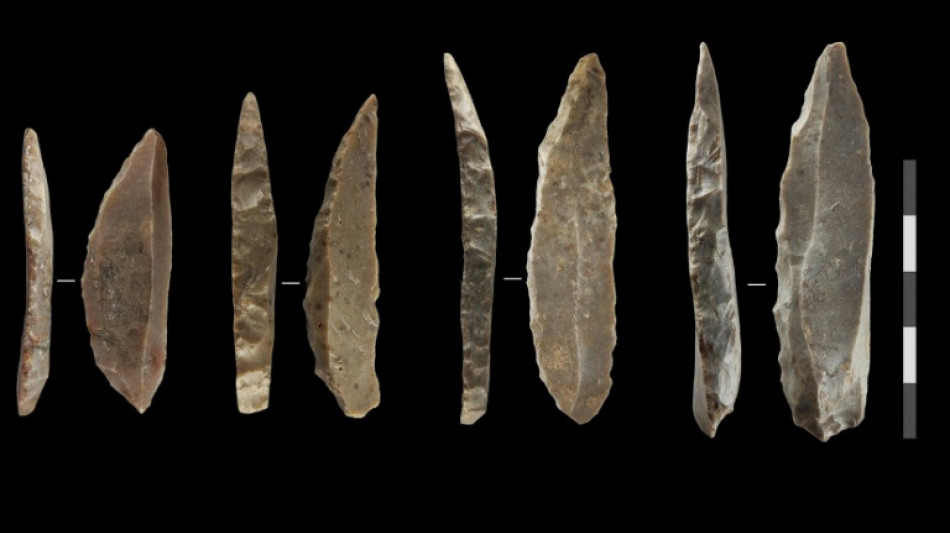
-
 Three in a row Piastri wins in Miami to lead McLaren one-two
Three in a row Piastri wins in Miami to lead McLaren one-two
-
Scheffler ties 72-hole PGA record in CJ Cup Byron Nelson romp

-
 Nicaragua says quitting UNESCO over press prize award
Nicaragua says quitting UNESCO over press prize award
-
Oscar Piastri wins Miami Grand Prix to lead McLaren one-two

-
 Bednarek runs this year's world-best 200m to win at Miami Grand Slam
Bednarek runs this year's world-best 200m to win at Miami Grand Slam
-
'Lucky number seven' for Ruud after beating Draper to clinch Madrid Open

-
 China's Zhao leads Williams 11-6 in world snooker final
China's Zhao leads Williams 11-6 in world snooker final
-
Far-right candidate tops Romania's presidential rerun

-
 Ryu takes wire-to-wire win at LPGA Black Desert Championship
Ryu takes wire-to-wire win at LPGA Black Desert Championship
-
Marseille held by fellow Champions League hopefuls Lille

-
 'Lonely' Palou cruises to win at IndyCar Alabama Grand Prix
'Lonely' Palou cruises to win at IndyCar Alabama Grand Prix
-
Zelensky says does 'not believe' Russian truce pledge

-
 US Fed expected to pause rate cuts again, await clarity on tariffs
US Fed expected to pause rate cuts again, await clarity on tariffs
-
Ruud beats Draper to win Madrid Open and claim maiden Masters

-
 Far-right candidate leads Romania's presidential rerun
Far-right candidate leads Romania's presidential rerun
-
Parag's six sixes in a row, Pant flops in IPL

-
 Howe hails Newcastle's 'ruthless' Isak after VAR drama in Brighton draw
Howe hails Newcastle's 'ruthless' Isak after VAR drama in Brighton draw
-
Pant woes continue as Lucknow lose to Punjab in IPL

-
 'Thunderbolts' strikes big, topping N.America box office
'Thunderbolts' strikes big, topping N.America box office
-
Kompany player-led shake-up returns Bayern to Bundesliga summit

-
 Leverkusen draw hands Kane's Bayern Bundesliga title
Leverkusen draw hands Kane's Bayern Bundesliga title
-
Chelsea sink champions Liverpool, Man Utd crash at Brentford

-
 Bielle-Biarrey lifts Bordeaux past Toulouse and into Champions Cup final
Bielle-Biarrey lifts Bordeaux past Toulouse and into Champions Cup final
-
Chelsea beat champions Liverpool to boost top five push

-
 Hammers' Potter reveals Paqueta's tears of frustration at Spurs draw
Hammers' Potter reveals Paqueta's tears of frustration at Spurs draw
-
Lyon's Champions League hopes hit by loss to Lens

-
 Israel vows retaliation against Iran, Yemen's Huthis over airport attack
Israel vows retaliation against Iran, Yemen's Huthis over airport attack
-
Man Utd 'need to change' after Brentford loss: Amorim

-
 China's Zhao dominates Williams 7-1 in first session of World Snooker final
China's Zhao dominates Williams 7-1 in first session of World Snooker final
-
Zelensky says does 'not believe' Russian truce promises

-
 Bielle-Biarrey double lifts Bordeaux past champions Toulouse and into Champions Cup final
Bielle-Biarrey double lifts Bordeaux past champions Toulouse and into Champions Cup final
-
Trump says 'I don't know' if must uphold US Constitution as president

-
 Brazil police foil Lady Gaga gig bomb plot
Brazil police foil Lady Gaga gig bomb plot
-
Godolphin in full bloom as Desert Flower wins 1000 Guineas

-
 Almeida wins Tour de Romandie as Evenepoel claims closing time-trial
Almeida wins Tour de Romandie as Evenepoel claims closing time-trial
-
Bolsonaro leaves hospital three weeks after abdominal surgery

-
 Man Utd crash at Brentford, Isak rescues Newcastle
Man Utd crash at Brentford, Isak rescues Newcastle
-
Romanians vote in tense presidential rerun as far right eyes win

-
 Lyon see off Racing to set up Challenge Cup final against Bath
Lyon see off Racing to set up Challenge Cup final against Bath
-
Kolkata survive Parag's six-hitting blitz to clinch IPL thriller

-
 Israel vows retaliation against Yemen's Huthis over airport attack
Israel vows retaliation against Yemen's Huthis over airport attack
-
Mbappe maintains Real Madrid Liga dream in Celta thriller

-
 UNESCO says Nicaragua quitting over press prize award
UNESCO says Nicaragua quitting over press prize award
-
Church donation box goes digital in Greece

-
 Germans mark liberation of Ravensbrueck Nazi camp
Germans mark liberation of Ravensbrueck Nazi camp
-
Missile hits Israel airport area in Huthi-claimed attack

-
 DeChambeau eyes PGA Championship battle after South Korea LIV win
DeChambeau eyes PGA Championship battle after South Korea LIV win
-
Chinese president to visit Russia on May 7-10: Kremlin

-
 'We don't care': weddings go on in Pakistan's Kashmir border
'We don't care': weddings go on in Pakistan's Kashmir border
-
Missile hits Israel airport area in attack claimed by Yemen's Huthis


Neanderthals, humans co-existed in Europe for over 2,000 years: study
Neanderthals and humans lived alongside each other in France and northern Spain for up to 2,900 years, modelling research suggested Thursday, giving them plenty of time to potentially learn from or even breed with each other.
While the study, published in the journal Scientific Reports, did not provide evidence that humans directly interacted with Neanderthals around 42,000 years ago, previous genetic research has shown that they must have at some point.
Research by Swedish paleogeneticist Svante Paabo, who won the medicine Nobel prize last week, helped reveal that people of European descent -- and almost everyone worldwide -- have a small percentage of Neanderthal DNA.
Igor Djakovic, a PhD student at Leiden University in the Netherlands and lead author of the new study, said we know that humans and Neanderthals "met and integrated in Europe, but we have no idea in which specific regions this actually happened".
Exactly when this happened has also proved elusive, though previous fossil evidence has suggested that modern humans and Neanderthals walked the Earth at the same time for thousands of years.
To find out more, the Leiden-led team looked at radiocarbon dating for 56 artefacts -- 28 each for Neanderthals and humans -- from 17 sites across France and northern Spain.
The artefacts included bones as well as distinctive stone knives thought to have been made by some of the last Neanderthals in the region.
The researchers then used Bayesian modelling to narrow down the potential date ranges.
- 'Never really went extinct' -
Then they used optimal linear estimation, a new modelling technique they adapted from biological conservation sciences, to get the best estimate for when the region's last Neanderthals lived.
Djakovic said the "underlying assumption" of this technique is that we are unlikely to ever discover the first or last members of an extinct species.
"For example, we'll never find the last woolly Rhino," he told AFP, adding that "our understanding is always broken up into fragments".
The modelling found that Neanderthals in the region went extinct between 40,870 and 40,457 years ago, while modern humans first appeared around 42,500 years ago.
This means the two species lived alongside each other in the region for between 1,400 and 2,900 years, the study said.
During this time there are indications of a great "diffusion of ideas" by both humans and Neanderthals, Djakovic said.
The period is "associated with substantial transformations in the way that people are producing material culture," such as tools and ornaments, he said.
There was also a "quite severe" change in the artefacts produced by Neanderthals, which started to look much more like those made by humans, he added.
Given the changes in culture and the evidence in our own genes, the new timeline could further bolster a leading theory for the end of the Neanderthals: mating with humans.
Breeding with the larger human population could have meant that, over time, Neanderthals were "effectively swallowed into our gene pool," Djakovic said.
"When you combine that with what we know now -- that most people living on Earth have Neanderthal DNA -- you could make the argument that they never really went extinct, in a certain sense."
Y.Aukaiv--AMWN


